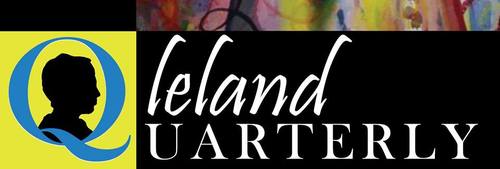
The twinkling bulbs in a dimly lit Kairos seemed particularly inviting when I shuffled in, late, for my first (appallingly so) Tuesday in the Poolroom. Fortunately, a friend and I found a cozy azure couch laid out with our own copies of The Leland Quarterly, and kids I’ve never met began trickling in, sauntering to their seats. This night, a group of student writers were given the chance to read from their work, published in the newest issue of The Quarterly.
Editor of The Quarterly, Brian Tich, after a charming introduction at our couch, made his way to the singular chair on the little stage. His editors note entranced me immediately, titled: “Why I wish Javier Bardem were here to explain it all to me…”, referring seamlessly to Woody Allen’s film, one of my favorites, Vicky Cristina Barcelona. In an eloquent discussion of language, Tich tells us that perhaps a new language is something that must be inevitably acquired at the cost of altering oneself.
“Whether the language is French or C++, chemistry or philosophy, photography or biology— In short, any of the things you might come to Stanford to get good at— we can’t claim to not be altering ourselves in the process, and much more than our own sense of continuity would probably suggest.”
I found myself thinking back to my time in Spain, thinking I was fluent and realizing that language is not just a way to speak, but really a way to be, one to exist. To be a poet in one language, and to be one in another, are two entirely different ways of feeling (Often, the things that get lost in translation can be the most precious.)
The first reader, Irene Hsu, recounts her short fiction story “Smoke Spot,” the thoughts of a boy who has witnessed murder with a twist. We hear the points of view of multiple people on the matter, including his mother, best friend, each telling their own version of what occurred. When I saw this title, I thought the whole piece was going to be about teens hanging out and smoking weed, which turned out to only be partially true. I was impressed by the realistic quality Irene gave to the dialogue, as well as the complex situation created for the character.
Wyatt Hong’s “Properties of Oxygen” gave me absolute shivers as his voice resonated, level, in the tiny couch-laden room. Inscribed into a black page in the Leland Quarterly magazine in a big, white O, the poem’s lines read by Hong echoed: “A drug of natal addiction that keeps/A man’s heart revving like the engine of a car.” Hearing Hong read this poem, as closely I followed along the copy I had in front of me, altered the feeling entirely for me. The flickers of emotion in his voice gave lines a new importance.
Following Hong, Max Walker Silverman sauntered up, bottle of beer in hand and, with the warmth of a tale told by the fire and a hint of tentativeness, recited his poems. His first reading, “Upwards West” evoked a road-trip feeling between a father and son. I admired this piece for its brief, simple, and powerful lines: “The old man rides shot gun/with a young man’s grin.” I was immersed in a sense of nostalgia, almost tasting the overbearing breeze of the open highway.
My personal favorite was “22 Fillmore”, which, as astutely noted by contributor Bojan Srb, echoed a Ginsberg-like quality that smelled of cigarette smoke and sixties nostalgia. “22 Fillmore/I see Che Guevara/40 years past his death, bearded./A tragic lineup of lookalike bums and visionaries—/22 Fillmore someone broke your heart/but I still think you’re pretty, take off your sunglasses.” In this rainbow lighted room, it was easy for me to imagine the scene to perfection, the inimitable beauty of, as Walker-Silverman put it, “humanity’s fragrant grime.”
In the nonfiction piece “Rush”, we heard the story of Helen Anderson’s month long stint in New York City, intimate and vibrant. The confessional tone evoked the fast-paced, no-nonsense environment, as Anderson told us of her life-skimming moments of New York City. Through the whole piece, she placed us in her position:
“Your fears were always misplaced, caught up in some theme park version of real life. You let yourself dig into the rush of the scare, and then you would jump into the waiting hammock of relief. This is just the city going about its business. No one is going to get hurt.”
I was caught up in the scraps of dialogue and gut wrenching moments in the piece, told with the coolness of a veteran. For me, the adrenaline of New York City is foreign, but this piece made it real.
Natasha Avery read an excerpt from her short fiction piece, “Sprout”, about Mary, a beautiful, single, and pregnant newcomer at her new job who piques the curiosity of the office. The ever-snacking Mary tempts the always-dieting narrator in a yogurt-covered pretzel, and Avery excruciatingly left us on the line, “I hadn’t realized I had been hungry for so long.” I begged to know more about Mary and her heckling officemates. I can’t say I didn’t flip forward a few pages to figure it out. I was impressed by the realistic newcomer buzz Avery was able to craft in her story, and how easily I was caught in it.

Student Organizing Committee for the Arts hosts Tuesdays in the Pool Room every other Tuesday in Kairos. Check out their website and upcoming here.
